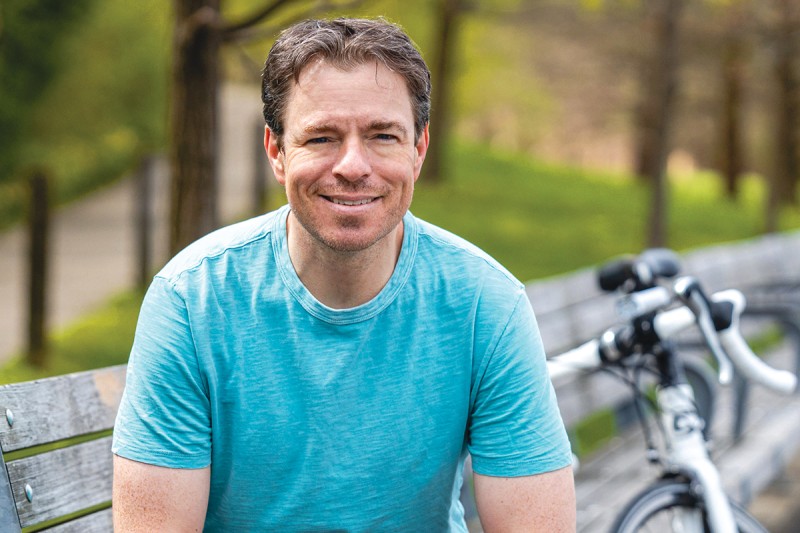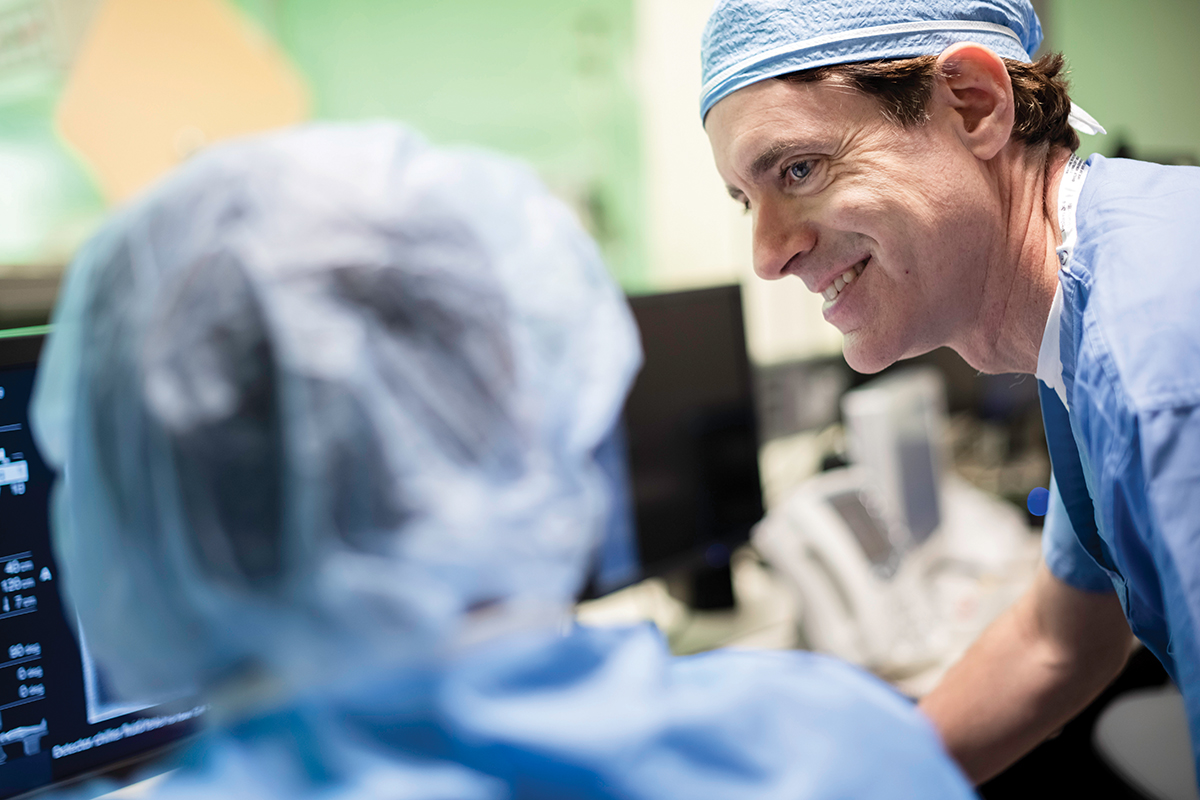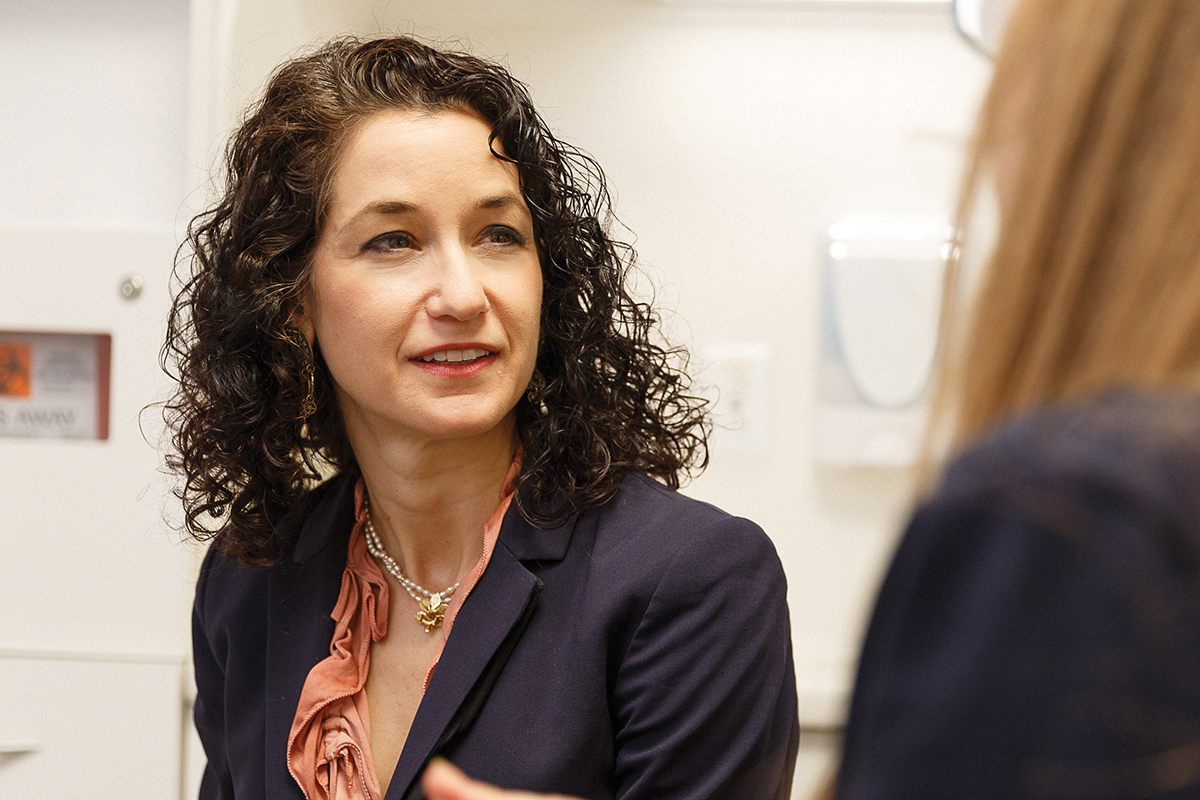
Kieran Healy saw an MSK expert within a week of calling for an appointment. He was quickly diagnosed with a type of lymphoma and joined a clinical trial that gave him access to a new drug. Now cancer free, Kieran is back to enjoying 40-mile bike rides.
Kieran Healy was feeling worse by the day. A new father at 43 years old, he was bone-tired and losing weight. He had night sweats and a strange lump in his belly. His local hospital in Manhattan ordered an ultrasound and a CT (computed tomography) scan — but they were scheduled over a month away.
“It was clear that something was going wrong,” says Kieran, an avid cyclist and documentary film editor. “But I wasn’t getting answers as to what.”
When he finally got the scan, doctors suspected cancer — most likely lymphoma. They said the next steps would be a biopsy (taking a tissue sample) and a different test called a PET (positron emission tomography) scan, but the appointments were delayed for another two weeks.
Not wanting to wait a moment longer, his wife, Emily, called Memorial Sloan Kettering Cancer Center (MSK) to arrange a second opinion. Things moved quickly, thanks to MSK’s new Rapid Diagnosis program, which expedited the process to get Kieran a cancer diagnosis and treatment by specialists within just 10 days of his first appointment at MSK.
Kieran says getting access to MSK’s world-renowned experts was easier than he and Emily expected, or could have hoped.
“The MSK team was like, ‘Something is wrong. We’re getting you in here,’ ” he says. “I felt so much better about being taken care of at MSK.”
A Fast Path to Treatment for Lymphoma
Within 10 days, everything changed for Kieran. First, he met with interventional radiologist Stephen Solomon, MD, who ordered an imaging test that same afternoon. The next day, Dr. Solomon’s team performed a biopsy. Using precise MRI (magnetic resonance imaging)-guided scans, they were able to extract a tumor sample from his upper torso near the armpit — a safer region than his abdomen.

Dr. Stephen Solomon leads the MSK Rapid Diagnosis program.
The tumor was analyzed by MSK pathologists (doctors who use a microscope to make a diagnosis). They diagnosed Kieran with diffuse large B cell lymphoma — one of the more than 70 types of lymphoma. Then, the team narrowed the diagnosis even further: to a rare and aggressive subtype called T cell rich.
Kieran met with medical oncologist Ariela Noy, MD, who told him the cancer had already damaged his liver and bone marrow. He was admitted to the hospital that day.
Thanks to the diagnostic testing he received at MSK, doctors knew quickly that Kieran qualified for an MSK-run clinical trial (research study). He started treatment with a chemotherapy called R-CHOP, combined with epcoritimab — a new type of drug to boost the body’s own immune response against lymphoma cells.
“It felt like MSK’s main goal was to get me better as fast as possible, and they found a way to do it more efficiently,” says Kieran. “You could tell that they cared.”
Peace of Mind for People Worried They Have Cancer
The speed with which Kieran’s cancer was diagnosed and treated reflects a coordinated effort to make sure that MSK is accessible to anyone with a suspected cancer. Previously, people needed a confirmed cancer diagnosis before being seen at MSK.
“If you have a scan with a suspicious spot, we can get you in right away to be evaluated,” says Dr. Solomon. “The big advantage to coming to MSK first is that we are set up to do biopsies quickly, with the most expert interventional radiologists and pathologists working together to deliver a fast and accurate diagnosis.”
Kieran’s Recovery from Lymphoma

Dr. Ariela Noy is a specialist in treating lymphoma and certain forms of leukemia.
Kieran, whose cancer had engulfed his liver and spread to other organs, is now in remission. After one year of therapy, he is no longer in treatment.
“We don’t see any lymphoma,” says Dr. Noy. “His overall health is great.”
Kieran calls Dr. Noy “Super-Oncologist,” because she’s his superhero.
“These people are top in their field,” says Kieran. “They really tried to help me understand everything that was going on. They didn’t just say: ‘This is what we do. Enjoy your chemo.’ They explained the illness and the treatment, and they were very honest with me.”
Kieran says those moments with his doctors and nurses kept him strong. “The confidence you have in your care helps make the fight better, knowing that you don’t have to worry about whether or not your team is just going through the motions and the protocols,” he says. “I felt they really cared about me.”
Kieran will continue to be carefully monitored for recurrence, but now he is planning for the future. He is back on his bike again and took part in a 55-mile ride around the boroughs of New York City this spring to raise money for cancer research.
“I can get back to the way I was,” says Kieran. “I’m able to exercise. I can play with my son and really horse around with him. I’m almost back to feeling normal, mentally and physically.”
Kieran talks about the future with enormous gratitude and exuberance for life. His new documentary tells the story of the popular R&B singer Gloria Gaynor, through the many twists and turns of her career. Her big hit could also be the theme song for Kieran’s journey: “I Will Survive.”
The first step is to make an appointment online or call at 800-525-2225. An MSK Patient Access representative will help you schedule an appointment with an interventional radiologist — usually within 2 to 4 business days.
Patients need to provide their medical records — typically their CT or PET scans.
The Benefits of MSK Rapid Diagnosis
- MSK diagnoses and treats more than 400 different types of cancers. Our pathologists (doctors who use a microscope to make a diagnosis) are some of the world’s leading experts in diagnosing both common and rare types.
- MSK has a unique molecular test called MSK-IMPACT®, which looks for mutations in more than 500 genes that could be driving the cancer. These results help pinpoint the right diagnosis and treatment plan.
- Being diagnosed at MSK means having access to clinical trials (research studies) for the latest therapies that may not be available elsewhere.
- Having the biopsy (tissue sample) done at MSK eliminates the time and effort required to track down specimens from other institutions.
- Reducing the number of appointments before seeing a cancer specialist is a relief for patients who are anxious to get treatment started as soon as possible.


